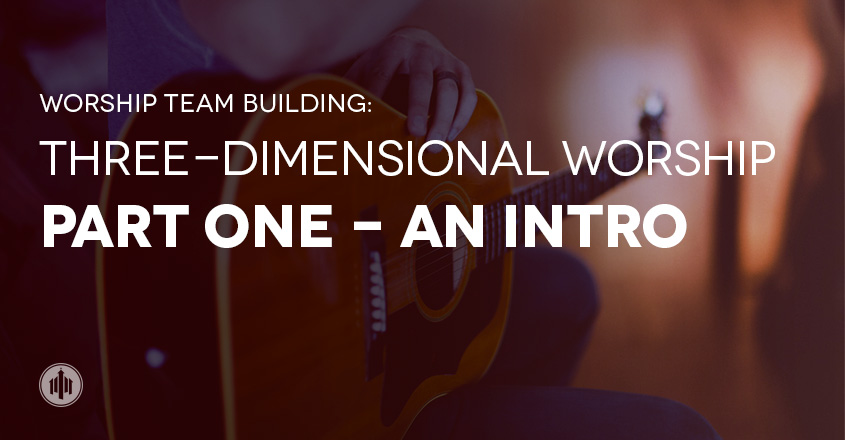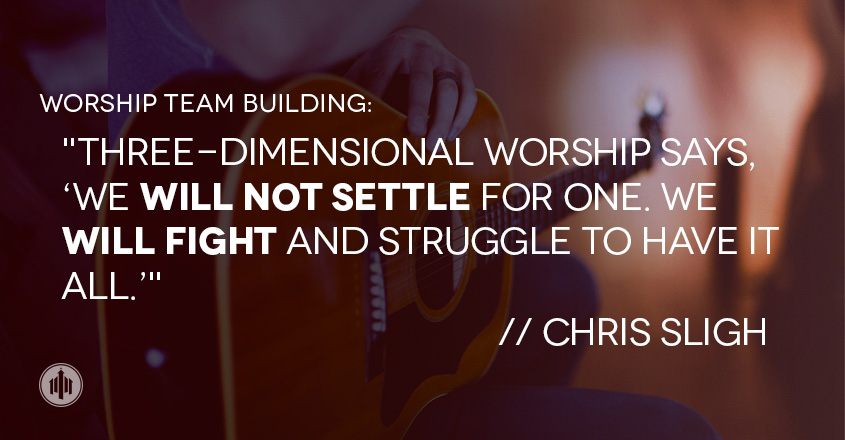 Let’s be perfectly honest: it’s hard to build a worship program in any church – big, small, medium and everywhere in between. Building systems and processes that pastor your people while churning out the best “product” (yes, I use that term intentionally) is difficult in any sized church. In my experience most large churches didn’t build the right systems and processes when they were small so now that they’re big they still struggle to do things well. It’s amazing how many large church worship pastors or creative directors I know who feel like they are flying by the seat of their pants.
Let’s be perfectly honest: it’s hard to build a worship program in any church – big, small, medium and everywhere in between. Building systems and processes that pastor your people while churning out the best “product” (yes, I use that term intentionally) is difficult in any sized church. In my experience most large churches didn’t build the right systems and processes when they were small so now that they’re big they still struggle to do things well. It’s amazing how many large church worship pastors or creative directors I know who feel like they are flying by the seat of their pants.
Part of the struggle is cultural – what is the background of the church? How did the leaders before you do things? What sacred cows about worship/creative does your leadership have? How empowered are you as a leader to lead and direct change in your department? And a million more questions… every church is different in some ways. But in other ways, every church is the same. And I am coming to the conclusion more and more that – while certain techniques might be handled differently per culture – every church worship program can, in some ways, be handled exactly the same no matter the culture. Over the past more than fifteen years of worship ministry and artistry within the church, after being in worship and creative positions from church startups to small churches to medium sized churches to megachurch off-site campuses to the mothership of a megachurch, I have begun to see that in every church I’ve been lucky to be a part of, certain things always seem to work and certain things always seem to fail. And as I study the Big C Church, and ask questions of other leaders and read article after article, I become more and more convinced that there are ways to ensure success in worship ministry.
This isn’t a snake oil sales pitch. It isn’t a magical potion. I hope that this exploration of church ministry in the modern church is more about transferrable principles than absolute truths. I want it to be a practical guide to building church ministry, not for numbers’ sake but something far more rounded… far more three-dimensional.
I’d like to introduce you to the idea of Three-Dimensional Worship. I hope it can revolutionize your ministry as it has the ministries I’ve been able to implement it. The desire is that it be both philosophical and practical; ethereal and grounded. I hope that it can simply take something that might feel like it’s missing something to filling in the empty spaces to create something that suddenly begins to take shape and feel 3D.
THREE-DIMENSIONAL WORSHIP: AN INTRODUCTION
I’d like to suggest that the goal of every church worship program should be to be complete and well-rounded. Which of course brings us to the question of how to determine or define that. In the paradigm of Three-Dimensional Worship, I’d suggest that well-rounded (or three-dimensional) could be defined by equal strengths in three dimensions: skill, passion and knowledge.
Skill is pretty easy to define – it’s the easiest thing to recognize. If someone can play an instrument well or sing on pitch, we can easily see that. In worship ministry, it’s usually the first indication that someone might fit into our team: they bring a skill to the table and that is the first step towards being a part of the team. Passion is both hard and easy to define. On one hand, we’ve all seen the worship leader or the player who “performs” well. They show passion on stage and move well and can certainly give the impression that they care about what they’re singing. That is one indication of passion, sure. But I’ll contend that passion is not just the passion we show on stage, but the ability to call others to passion, the ability to invoke passion in those they are leading. Finally, knowledge is the hardest to pin down. Knowledge is not just an understanding of the Word. It is not just an understanding of what it means to be a leader of worship. It is not just an understanding of the role they play in leading others into worship. It is all of this and more.
Whether they realize it or not; whether the choice is conscious or not; in my experience, most churches’ worship programs make a choice to pursue one of the three over the others. We all have been to the churches that have a paid band that plays all the notes incredibly well, but no one on stage seems to care about what is being sung. We’ve probably all had the experience of being in a church that had plenty of passion – hands raised on stage, people passionately singing the words and calling others to passion, people dancing, people excited about worship – but the skill was… subpar at best. And we’ve likely all been to the church where skill and passion were pretty meaningless, but making sure people understood the intricacies of what Scripture calls us to in worship was a huge part of the culture.
And yet we all watch ________________ (fill in the blank with whatever church you most resonate with) and I’d guess that church seems to have it together. And I believe there’s a reason for that. Bethel Music is my church of choice. I watch their services and literally 100% of the time, I am called to something greater. It doesn’t matter that I don’t agree with some of their theological stances. It doesn’t matter that they are certainly far more “charismatic” than any church I’ve been at and will ever be at. What matters is that when I watch their services, I see a three-dimensional model of worship: they speak truth and knowledge over the congregation; they are incredibly passionate and invoke the same passion from their congregation; and man are they good.
Three-dimensional worship says, “We will not settle for one. We will fight and struggle to have it all: excellence in skill, passionate worship and a knowledge of the Word and our place within the Scriptural history of leading worship through music.”
So to end this introduction: skill, passion and knowledge play themselves out in similar and different ways per culture. Some congregations are never going to be remotely charismatic in how people outwardly display their worship, so the leaders’ passion will need to in some ways fit the culture… while stretching the culture. Some churches have a deep understanding of worship, others do not. So the knowledge piece and where to begin will be different in every place. And ultimately the skill piece is dependent on what talent your church has and how you can best build on those skills. But the beauty of the systems and processes I will suggest can be built around this paradigm of Three-Dimensional Worship is that no matter the starting place, the philosophies of WHY we do what we do are transferrable and can be fit to whatever place your church might be.
I pray that these articles can challenge you and your teams to something greater, in the same way that I have been challenged to something greater.



